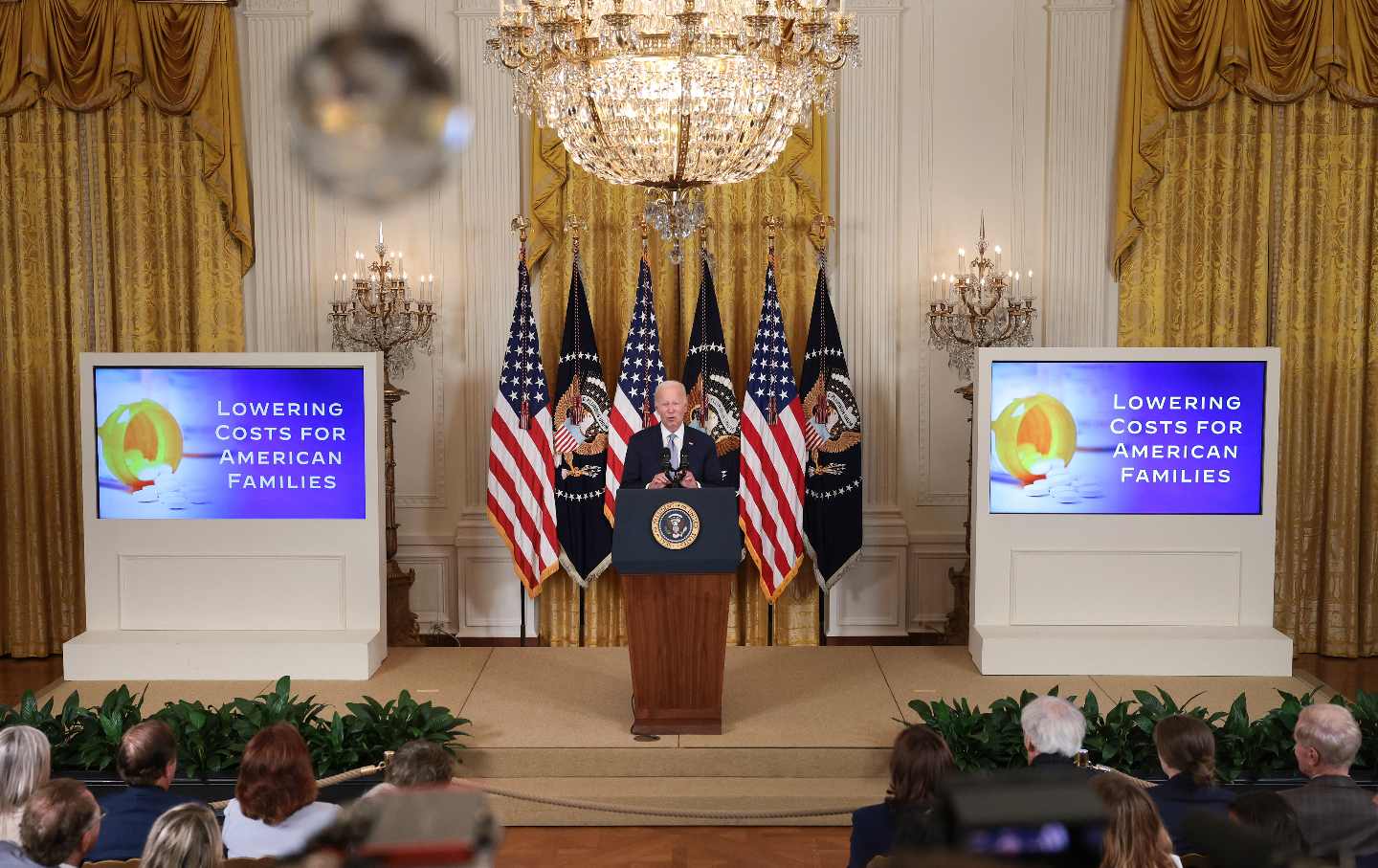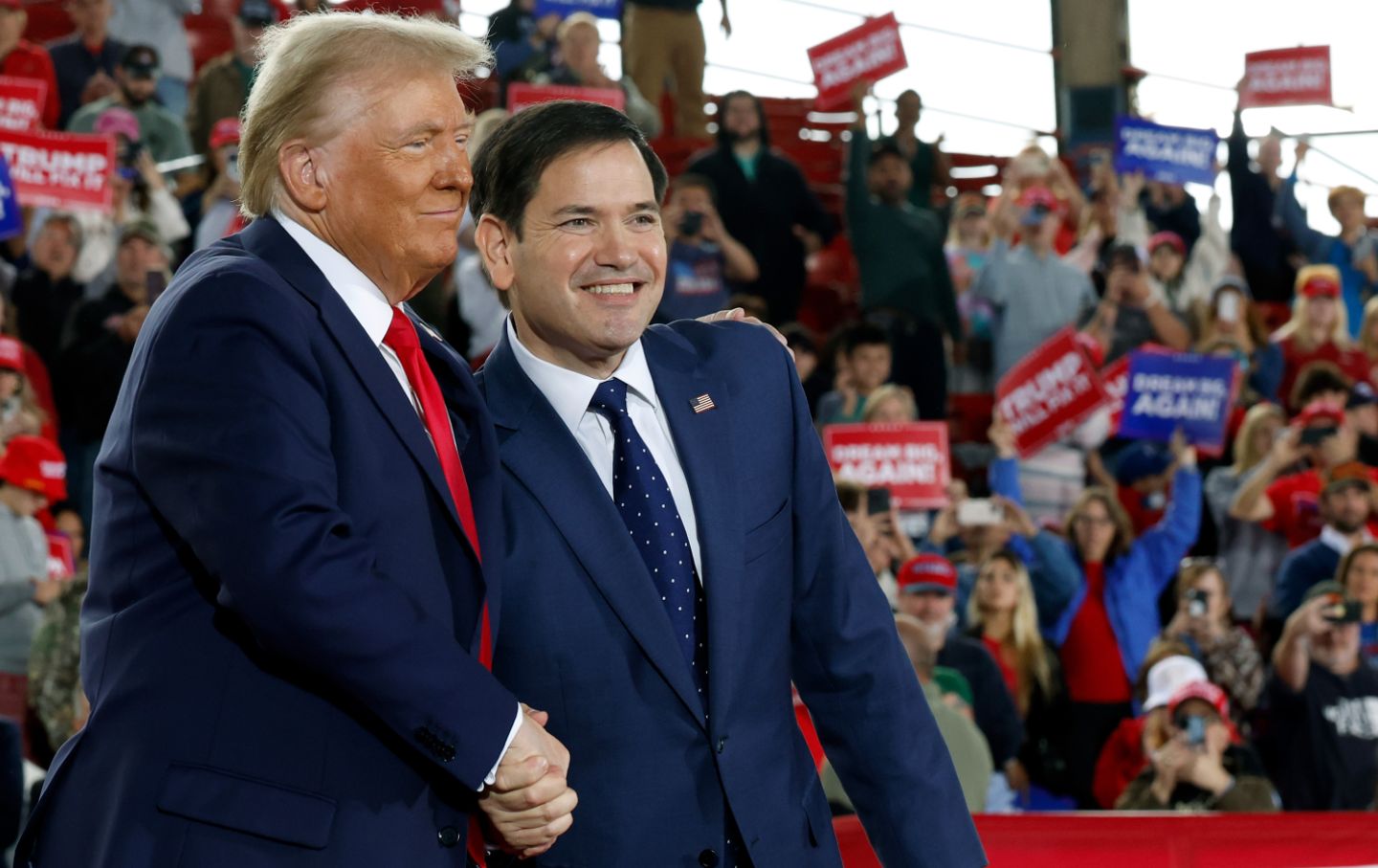Biden’s Bold Move on Drug Prices Gives the GOP Two Choices: Change the Subject, or Lie
Not surprisingly, Trump opts for both.

President Joe Biden speaks at an event promoting lower health care costs in the East Room of the White House on August 29 in Washington, D.C.
(Win McNamee / Getty Images)In a recent blog post, former Obama adviser Dan Pfeiffer, one of the shrewdest political strategists among mainstream Democrats, flagged some distressing polling showing a “neck and neck” race in the likely rematch between Joe Biden and Donald Trump in next year’s presidential contest. Key parts of the Democratic coalition, notably young people, are dissatisfied with Biden. They aren’t rushing to vote for Trump or any other Republican. But a critical mass of such voters might just sit out the election—or vote for a plausible third-party candidate like Cornel West. To his credit, Pfeiffer eschews the tired tactic of vote-shaming these demobilized Democrats and instead advocates for Biden to win them back into the coalition.
Biden’s staff seems to be thinking along the same lines as Pfeiffer. On Tuesday, the White House announced a major policy change to lower drug prices. As Reuters reports, the Biden administration released a list of 10 “prescription medicines that will be subject to the first-ever price negotiations by the United States. Medicare health program that covers 66 million people, with big-selling blood thinner Eliquis from Bristol Myers Squibb and Pfizer among them.” As with other Biden reforms such as student debt relief, the main problem now is the courts, which are stacked with Republican justices eager to overturn progressive social policies.
Leaving aside the dangers from the court, Biden’s push on drug prices is a political master stroke. Simply as policy, it’s a long-overdue reform. The deference the United States government gives to big pharmaceutical corporations means that prescription drug prices are often more than two and a half times higher than they are in peer nations. The policy will also help shore up Biden’s support among exactly those voters that Pfeiffer sees as crucial to Biden’s reelection (young people who are to the left of Biden on economic issues and feel he hasn’t done enough to fulfill his promises).
Popular
“swipe left below to view more authors”Swipe →Drug price reform is also a stratospherically popular policy. According to a new survey from Data for Progress, “giving Medicare more power to negotiate lower prices for all prescription drugs” is strongly supported by 66 percent of the public, including 75 percent of Democrats, 63 percent of independents, and 59 percent of Republicans. If we combine “strong support” with “somewhat support,” we get a policy that is supported by 90 percent of the public, including 93 percent of Democrats, 88 percent of independents and 88 percent of Republicans.
A policy that overwhelmingly popular also has the supreme political virtue of completely boxing in Republican politicians, since even before the new policy was announced, the lack of a coherent Republican alternative was clear. The GOP is divided on the issue. Some Republicans are choosing to ignore the issue all together. Parts of the old business establishment remain committed to maintaining the status quo on drug prices. But that’s an untenable position, so we’re seeing counter-moves that broadly fall into the category of dishonesty: either creating distractions or offering solutions that are pure bunkum. Not surprisingly, former president Trump falls into the bunkum camp.
Silence is the most common response. As The Hill reported in early August, “President Biden is leaning into lowering health care costs as the White House shifts into campaign mode, but the issue is barely mentioned by the gaggle of GOP candidates barnstorming the country.” Of the 10 Republican presidential hopefuls contacted by The Hill to comment on their approach to the issue, only one (William Hurd) responded.
But with the Biden campaign clearly getting ready to make this one of the primary arguments in his reelection bid, keeping silent won’t be an option.
Remarkably, the business wing of the GOP is still parroting the talking points of Big Pharma. On Tuesday, Politico reported that some congressional Republicans are “piggybacking on the pharmaceutical industry’s strategy” and “working to persuade Americans that the Biden plan will stifle innovation and lead to price controls.” Former vice president Mike Pence voiced this sentiment, telling reporters in a call, “I would have concerns about, ultimately, being able to use the power of the government to impose price controls under the free market.”
Democrats should be delighted that Pence and others are falling into this trap. In a time of inflation, “price controls” is not a bogeyman that will scare many voters, especially since there is an overwhelming consensus that drug prices are too high. Speaking to Politico, Minnesota Senator Amy Klobuchar could barely contain her glee. “If they want to run their campaigns based on keeping the profits of the drug companies high, welcome,” she said. “Why don’t they go for it and see how well President Biden does because people are going to understand that seniors want to see less expensive drugs.”
A policy of defending the status quo is clearly doomed. One fallback position is to offer distractions. As Politico notes, Pence has “made general statements on improving transparency and competition to lower costs. He also proposed reviving Operation Warp Speed, the federal program created to expedite Covid-19 vaccines, but for new drugs.” Other Republicans suggest reforming pharmacy benefit managers, middlemen who drive up prices. These policies have some merit, but they don’t get to the root of the problem, which is that the government is allowing Big Pharma to set prices when it should be forced to negotiate (as it does virtually everywhere else in the world).
Donald Trump has had the most vigorous and dishonest response. He’s less beholden to free-market happy talk than most Republican politicians and more willing to promise executive action. As Semafor reports, “Donald Trump broke with many Republicans by backing federal negotiations and price caps on drug prices, including a late-term executive order intended to eventually tie drug reimbursements to international prices. In a press release Tuesday, he attacked Biden for reversing an unrelated 2020 executive order compelling the federal government to only purchase certain drugs and medical supplies produced in the U.S.”
Trump is offering a simple rehash of an executive order he signed in October 2020, one that was later blocked by courts in December 2020.
A 2020 report from the Center for American Progress accurately described Trump’s executive order as aimed at “tricking the public into believing that his administration will make meaningful changes to prescription drug prices” but only offering “bluster…without delivering for the American people.”
Over the last few years, the Republicans have had some success playing a shell game where Trump offers the public gimmicky faux-populist economic policy while the mainstream of the party upholds corporate oligarchy. We’re seeing this combination in action again on drug prices.
The task for Biden’s reelection campaign is to forcefully make clear that Trump is a snake oil salesman in the service of the same big-business bandits other Republicans serve.
In policy terms, Biden is heading in the right direction. Whether he is an effective enough communicator and candidate to sell his drug policies to the public, especially in the face of Trump’s dishonesty, remains to be seen. Good policy is half the solution; strong electioneering remains the vital other half.
More from
Jeet Heer 

No, Kamala Harris Staffers Did Not Run a “Flawless” Campaign No, Kamala Harris Staffers Did Not Run a “Flawless” Campaign
Democratic strategists are still patting themselves on the back for a catastrophic defeat.

Donald Trump’s Government of Gangsters Donald Trump’s Government of Gangsters
Who is being naïve now?

The Democrats Will Keep Losing Until They Solve Their Plutocracy Problem The Democrats Will Keep Losing Until They Solve Their Plutocracy Problem
The party’s habitual deference to big donors makes it impossible to effectively oppose Trumpism.

Only a Working-Class Party Can Challenge Donald Trump’s Corruption Only a Working-Class Party Can Challenge Donald Trump’s Corruption
GOP plutocracy thrives as long as Democrats remain beholden to Wall Street.

Biden’s Mindless Escalation Is a Final Betrayal of Ukraine Biden’s Mindless Escalation Is a Final Betrayal of Ukraine
Instead of preparing for inevitable negotiations, the outgoing president adds fuel to the fire.

Donald Trump’s Foreign Policy Will Be Chaos First, Not America First Donald Trump’s Foreign Policy Will Be Chaos First, Not America First
His team of cronies includes establishment hawks and cranky outsiders who are more likely to deliver global anarchy than world peace.


